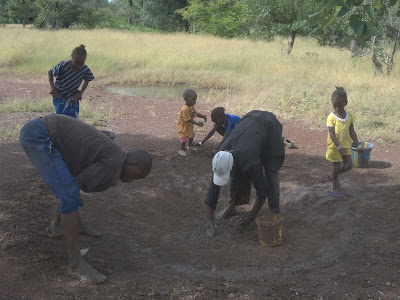Insight into herding: This little excerpt is about an event that takes place six times during the transition from rainy season to harvest time. I like to call it, "The Cow Party." Let me take you through the days events.
6 a.m. I wake up to the women pounding raw salt, leaves and bark with their mortar and pestles. People are excited because TODAY is COW PARTY DAY
7 a.m. One of my brothers knocks heavily on my corrugated tin door. "Aissatou! It's cow party day!" Although really its something like, "give the cows a medicinal drink day."
8 a.m. Whoever is herding that day goes to collect the cows and take them to the special spot in the woods where we will all meet.
9 a.m. The rest of my brothers, younger siblings and I start power walking to said special place to prepare for the cows arrival.
9:30 a.m. Those of us preparing for the cows arrive at the special spot and start digging a perfectly round 'bowl' for the cows. We take out rocks and try to make the bowl a perfect circle and as clean as possible (I mean it is a hole in the ground.)

10 a.m. We start filling buckets from a nearby seasonal pond and fill said cow bowl.

10:15 a.m. We break open a certain kind of branch to extract the insides that are good for the cows health.

10:30 a.m. We start washing these chunks of branches in the bowl. It produces a slimy substance that makes the water the right consistency. I am told that the slimy stuff prompts the cows to eat more. Anyways we scrub these pieces of branch for quite awhile to get all the good stuff out.

11 a.m. The consistency of the slimey water is checked over and over again.

11:15 a.m. The little girls and I get hot and decide to cool off in a little seasonal pond.

11: 30 a.m We all the pounded leaves to the mixture, next the pounded bark, then the pounded salt. Everyone tastes the mixture and determines if it is fit for the cows yet.
Noon. We heard the cows in the distance and my herding brothers and the cow drink preparation brothers start calling out to one another in random noises.
A little later, the cows come running in, excited, knowing wait is awaiting them. Here is a video of my brother Mamadian bringing in the cows. Pay attention to the calling noises of my brothers. I think they are pretty cool. (I didn't know I was still taping half way through. Whoops.)
My brother explain that they do this to keep the cows healthy. Each element has medicinal qualities. No one can quite explain it, as it is a tradition that has been passed down since the Pulaars started herding. It seems to me it's simply an oral rehydration drink for cows. Either way it is a fun past time and I thought it was interesting enough to share with ya'll. Hope you enjoy!




